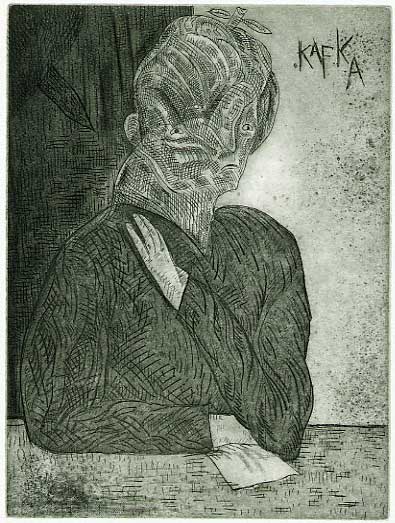


Franz Kafka, b. Prague, Bohemia, 3 July 1883, d. 3 June 1924, age 40. Kafka grew up in a middle-class assimilated Jewish family. He graduated the prestigious German high school in Prague and recieved a law degree in 1906. After school he got a position at the semi-public Worker's Accident Insurance concern and was an employee untill forced to retire in 1922 because of tuberculosis. The disease spread to his larynx and he died of starvation because it was too painful to eat. The language Kafka spoke and wrote in is known as Prague German, which is more akin to Viennese German than it is to the High German, which is more colloquial and nuanced with much slang and expression, thus his writing has a very "literary" feel. None of his novels were published during his lifetime and only a few of his short stories were. After his death his friend, the writer Max Brod, went through Kafka's papers and proceeded to get them published. English translations started to come out in the 1940s, some excellent, some not so good. Since his death Franz Kafka has been considered to be one of the major literary influences of the twentieth century and an artistic genius on a par with James Joyce, Marcel Proust, and Thomas Mann.
Franz Kafka was able to express the angst and spiritual and emotional alienation that has become part of the Western experience with the relentless process known as "modernism." Dislocation, confusion, and despair are hallmarks of his work. As an assimilated Jew in Prague, which had become a major administrative center for the Austro-Hungarian Empire, Kafka was exposed to the modernist stresses that were de-stabilizing the empire for decades before spreading to the rest of the continent and washing away the nineteenth century, the century of "progress," in the blood of the Great War. These forces were primarily nationalism, liberalism, anti-semitism, industrialism, the fading of the European aristocracies while the bourgious middle-classes were reluctant to define themselves, and the rise of irrational politics based on feelings and emotions, termed "the higher key," that would eventually culminate in the Nazi movement, the ultimate violent rejection of modernist civilization. Kafka expressed in a deeply moving way how the hugeness and absurdity of the modern world, drifting on a relativistic sea, affects the deeply personal core of individuals. Kafka's sensitivity to living in a culture where moral absolutes were non-existent and spirituality had been subsumed in the drive for efficiency and brutal economic rationality in the service of the state and the economy, in which people became lived by the system and discarded, is borne out in such a way as to remind people that they are ultimately valuable and need to defend themselves from fading into nothingness in the face of the overwhelming force and anonymity of modern life, the fading of Sheol. Like all great artists Kafka was able to explore and express the deeply personal and strike a chord that has been felt by many others in very different times and places. His ability to portray the surreal and the awesomely horrible in the midst of the dull ordinariness of everyday life is still striking today. Even people that have never read one of his books know what is "kafkaesque" when they see it. Kafka's artistry stands because people actually "feel" it viscerally and it stays with them throughout their lives.
This short novella is the most famous of Kafka's stories and has defined him in the public consciousness. When people think of Kafka the imagery of Gregor Samsa as a giant, bed-ridden bug is what usually comes to mind. More commentary has been written about this story than any other work of Kafka, except maybe The Trial. Here is some of the best commentary available on the web. Enjoy.

